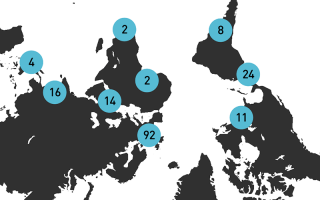Current Job Title: Consultant, UN-Habitat
Q: What initially sparked your interest in the DAP programme? What was your prior experience with development, if any, and what did you hope to achieve by participating in the course?
A: I have always been passionate about the issues of social justice and development, especially during my undergraduate degree. Following this, I gained some professional experience working at governmental offices at distinct levels in Mexico. Moreover, I decided to do an academic exchange in Madrid and social work at the Mexican Consulate in New York City. Both of these experiences helped me in identifying the high value of being exposed to an international environment in dynamic cities. These propelled my desire in pursuing a Masters degree in a global academic institution with a highly multicultural and multidisciplinary classroom composed of individuals that share the same mission of having a positive impact in the society.
Q: How or where did you first hear about the DAP programme?
A: I discovered the DAP programme through the UCL official website.
Q: What were your expectations? (Were these expectations adjusted once here?)
A: I had high expectations regarding the course, professors, department and the university. Today I can say that I feel strongly satisfied with this choice. Also, as I reflect back to my time at the Development Planning Unit, I realize that all the knowledge and skills acquired during the DAP programme has helped me in my professional life.
One of the aspects that I have found as a strong component of DAP is that it does not just provide you with the academic knowledge that you require for developing and working in the development sector. Through activities such as the field trip, seminars, and workshops, DAP continuously pushes students to engage and participate in creating a favorable environment for developing soft skills that are fundamental for anyone at any position level.
Q: What was your favorite aspect or feature of the DAP course? What was your favourite module or subject?
A: The relationship that the academic body and the students share is highly distinctive about DAP. The academic team is continuously supportive and cares about students’ positive development. For me, my favorite DAP module was Development in Practice, where I learned and practiced many of the tools that I am currently using at work. In addition to the core modules, it is a great advantage that you can decide from a high range of optional modules according to your interests, for instance, I chose optional modules around public services and infrastructure.
Q: How has your career developed since completing the course? Where have you been working since graduation, and how did you get into that role? How has the course prepared you for your current career?
A: UCL and DAP have provided me with valuable knowledge and tools for currently working as a consultant for the United Nations Human Settlements Programme Head Quarters based in Nairobi, Kenya. Within the Urban Economy and Finance Branch, I specialize in sustainable urbanization through a three-pronged approach composed of a legal framework, planning, and local finances. As a consultant, I contribute to proposals on municipal finance and sustainable urbanization for the successful implementation of the New Urban Agenda following the Agenda 2030 for Sustainable Development. These are done through the design of innovative strategies for improving governments capacities that are required to implement effective local services and infrastructure policies aimed to increase the quality of life and to achieve cities and human settlements that are inclusive, safe, resilient and sustainable (SDG 11).
Q: Do you have any words of advice for current or prospective students?
A: The DAP full-time masters at UCL it’s a highly demanding programme that happens fast. I would advise the students to study hard but at the same time, enjoy the journey.
UCL offers a significant number of high-quality facilities –you should make the best out of them. For instance, as MSc DAP students, you are allowed to go to Central House Library and the downstairs has a postgraduate hub with rooms that contain powerful desk computers, which are really useful when comparing and researching on multiple website and programmes. Moreover, if hungry, there is in the same area a kitchen where you can eat your food or prepare your coffee/tea. For me, I found central house literally as another home, as I spend many hours there and long nights.
Further, studying in UCL means being in one of the most competitive cities in the world. Take out some time to enjoy London! London is also an excellent opportunity for enhancing your professional and personal network. London is home to many global higher academic institutions. Therefore, I will advise you to keep an eye on the events and seminars that other universities are hosting, as the vast majority of them are for free and it’s an excellent opportunity to learn and meet people.
There are also a number of societies one can join and engage with a number of people. I was part of the UCL Mexican Society and I participated in the elaboration of the UCL Mexican Summit 2018 around the topic of Migration, which was another great experience for meeting other people interested in Mexican issues. Also, I was a member of the Salsa Society, which was fun and helpful during the beginning of the course to meet and make new friends.
Lastly, considering that the MSc DAP is an excellent programme, UCL is one of the leading universities in the world and London is one of the most competitive and dynamic cities in the globe, I would recommend that you use all these to enrich your academic and professional experience.
 Close
Close


